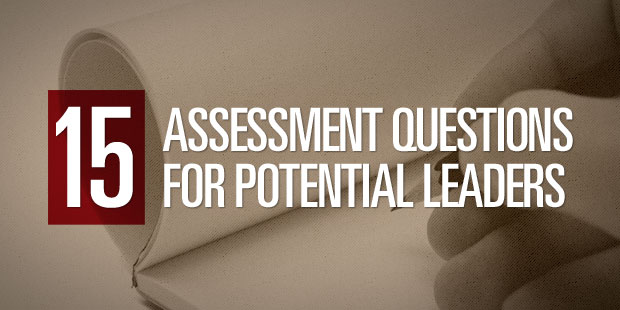
15 Assessment Questions for Potential Leaders
You know who they are: the young talents everyone eyes as executive material.
But sometimes these high-potential stars derail on their way to the top. “If they have strong results, but they sacrifice team members or the bigger picture, or are too self-serving, they would no longer be considered high-potential,” is what one executive told Jim Bolt in Fast Company.
Expert David Peterson, speaking in Talent Management magazine, concurs: “Someone who is hard-charging, smart and aggressive, is much more likely to get great results, but if they don’t learn to temper that to include other people, to get buy-in, to build alignment with other folks, they may alienate people or cause additional friction down the road.”
Okay — so how can you anticipate and prevent derailment in your leadership-development pipeline? Spencer Stuart, the global executive search consulting firm, compiled a list of 15 questions to judge leadership potential outside the realm of individual performance:
Leaving the comfort zone
1. Do I trust this person’s judgment in complex, ambiguous situations?
2. Has their decision-making been tested when leading a team outside of their area of expertise and in situations of great complexity and ambiguity?
Emotional intelligence and political savvy
3. How effectively does the executive read and respond to interpersonal dynamics in sensitive, high-stakes and complex situations?
4. Does the individual understand the power of his or her words and actions on others and quickly create alignment among stakeholders with divergent interests?
5. Can he or she successfully navigate politicized situations where personal relationships and a cooperative style are not sufficient?
Motivating and monitoring others
6. Does this person have a track record of building high-performing teams?
7. Is he or she willing to hold people accountable when they fail to meet objectives?
8. Does this person create an environment where people feel motivated to contribute, while also holding others to high standards?
Humility and flexibility
9. Does the individual show the mental flexibility to quickly evolve their thinking based on others’ inputs?
10. How does he or she react to feedback or criticism of their ideas?
11. Does he or she really listen to substantive input from people who know? Does he or she seek it out?
Molding others
12. Is talent development a priority for this executive? How has he or she demonstrated that it is a priority?
13. Are there a number of individuals in the organization whose careers have been shaped through their relationship with this executive?
Big-picture visions and leading through change
14. What are this person’s strengths? Does he or she come up with the big ideas? Are they most skilled at executing an idea from elsewhere?
15. In past situations of change, what was the individual’s role in developing the vision, influencing and motivating others to embrace the idea, and driving to a result?
Read more here.

Tags: Build Network, Leadership Development, Staff, Structure











